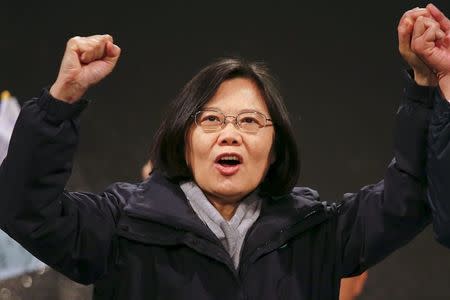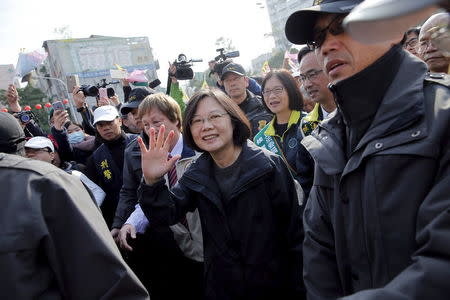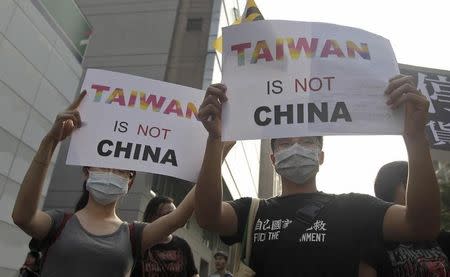It's all about China for Taiwan's likely new leader, and history's against her
By J.R. Wu and James Pomfret TAIPEI (Reuters) - Bespectacled and gently spoken, more don than politician, Tsai Ing-wen is almost certain to be voted Taiwan's first woman president on Saturday and, with China pointing hundreds of missiles at the island, thrust into one of Asia's toughest and most dangerous jobs. If she wins, she will lead an island which China claims as its sacred territory and will have to balance the superpower interests of China and the United States with those of her freewheeling, democratic home. As the head of the opposition, independence-leaning Democratic Progressive Party (DPP), Tsai risks antagonizing China if she attempts to forcefully assert Taiwan's sovereignty and reverses eight years of warming China ties under incumbent China-friendly President Ma Ying-jeou. Tsai has the tide of history against her. Ma and predecessors, including firebrand Lee Teng-hui and convicted opposition DPP president Chen Shui-bian, all failed to bring about a lasting reconciliation with China, which considers Taiwan a rogue province to be taken by force if necessary. Shots were traded between the two sides as recently as the mid-1970s. At stake are relations with an ascendant and increasingly assertive China under President Xi Jinping. "If (you) don't vote for the Nationalists, the future is really uncertain," said Ma in a final push for votes for his Nationalist Party in Taipei, a leafy, vibrant city splashed with billboards of Tsai and Nationalist rival Eric Chu, along with candidates contesting 113 parliamentary seats island-wide. "Our policy is aiming for peace and stability. We can ensure everyone that there won't be a war across the Strait," Ma said. Tsai, a trained lawyer, was fast-tracked to senior posts from a young age - first as Taiwan's chief trade negotiator in her 30s, then as Taiwan's main China affairs minister in her 40s. Those in her inner circle speak of a strategically-minded and cautious individual with a firm grasp of details and a pragmatic long view. "I walked out of a Taiwan that was under the Nationalists' martial law and I was washed in America's democracy. That is how I established my identification of what is a nation," said Tsai in her 2011 autobiography. She traveled to China in the late 1990s for the first time as a translator for Taiwan's top cross-Strait negotiator who met former president Jiang Zemin. Ever smiling, though sometimes barely audible when chatting with ebullient supporters on the campaign trail, Tsai has rebounded from defeat in the 2012 election to Ma to what opinion polls have predicted could be the biggest ever margin of victory for a Taiwan leader. "SMARTEST IN THE ROOM" While the Nationalists have attacked Tsai and the DPP as a grave threat given the party's independence-leaning stand, some say she could confound her critics. "There is no question she has a tremendous amount of capability," said a Taipei-based foreign official who spoke on the condition of anonymity. "It really depends on what else happens on the mainland. It will be things that will be outside of her control." This week, China's influential state-run tabloid the Global Times said that while Tsai was more moderate that Chen, uncertainty lay ahead. Beijing would take a watch-and-see approach. "Taiwanese society will suffer the most if peace across the Taiwan Strait is overturned," it said. In biographies, two written by her and one semi-authorized, a picture emerges of Tsai as a patient negotiator unwilling to score quick points or concede too much. "My experience has shown me that with enough patience and intelligence, I will wait for the right timing that benefits me before making a decision," said Tsai in her 2011 book. Despite this, the United States has expressed concerns about the danger of worsening China-Taiwan ties, at a time when China's navy is increasingly flexing its muscles in the South China and East China Seas and expanding territorial claims. U.S. President Barack Obama's deputy national security adviser Ben Rhodes called on Taiwan and China to avoid an escalation of tensions. But he stressed Washington did not take sides in the poll and wanted Taiwan-China issues dealt with peacefully, whoever won. Poised as one of the most prominent female leaders of the Chinese-speaking world since the Qing dynasty Empress Dowager Cixi, however, has not convinced a wide swathe of domestic constituents and foreign allies that she'll steer a stable course in ties with Beijing. She has been ambiguous on her China policy, merely pledging, in public anyway, to maintain the status quo. "She won't box herself in to a particular formula or phrase," said a former senior Western diplomat who has known her for 20 years. "As an actual leader, certainly having someone who is thoughtful and reflective is not necessarily a bad thing," he added. "This leaves room for negotiation where otherwise (being too passionate) it may be seen as inflexible or problematic." In the traditionally independent-minded and nationalistic south, long a stronghold of the DPP, are an older generation of Taiwanese, who see themselves as true natives unlike the defeated Nationalists under Chiang Kai-shek fleeing China to the island in 1949. How Chang-cheng, 60, a former engineer, fishing on a bridge, spoke of his sadness, with both sides having sacrificed so much over the decades. "China talks about resolving the tensions, but they are still pointing some 700 missiles towards us. One could come flying over any time," said How, sweeping his arm towards the horizon beyond which lay the coastline of China's Fujian province. "We must try to protect our democracy. China will try to take it away from us. But if we step over the red line, there could be war. Maybe that's why we need someone who's calmer like Tsai. Maybe she can make a difference." (Additional reporting by Ben Blanchard, Yimou Lee and Faith Hung; Editing by Nick Macfie)










